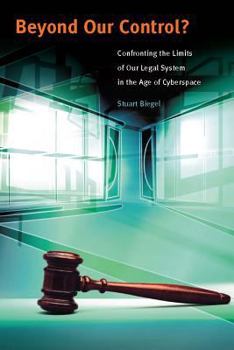Beyond Our Control?: Confronting the Limits of Our Legal System in the Age of Cyberspace
Select Format
Select Condition 
Book Overview
An examination of current and emerging issues in cyberlaw.
This book provides a framework for thinking about the law and cyberspace, examining the extent to which the Internet is currently under control and the extent to which it can or should be controlled. It focuses in part on the proliferation of MP3 file sharing, a practice made possible by the development of a file format that enables users to store large audio files with near-CD sound quality on a computer. By 1998, software available for free on the Web enabled users to copy existing digital files from CDs. Later technologies such as Napster and Gnutella allowed users to exchange MP3 files in cyberspace without having to post anything online. This ability of online users to download free music caused an uproar among music executives and many musicians, as well as a range of much-discussed legal action.
Regulation strategies identified and discussed include legislation, policy changes, administrative agency activity, international cooperation, architectural changes, private ordering, and self-regulation. The book also applies major regulatory models to some of the most volatile Internet issues, including cyber-security, consumer fraud, free speech rights, intellectual property rights, and file-sharing programs.





